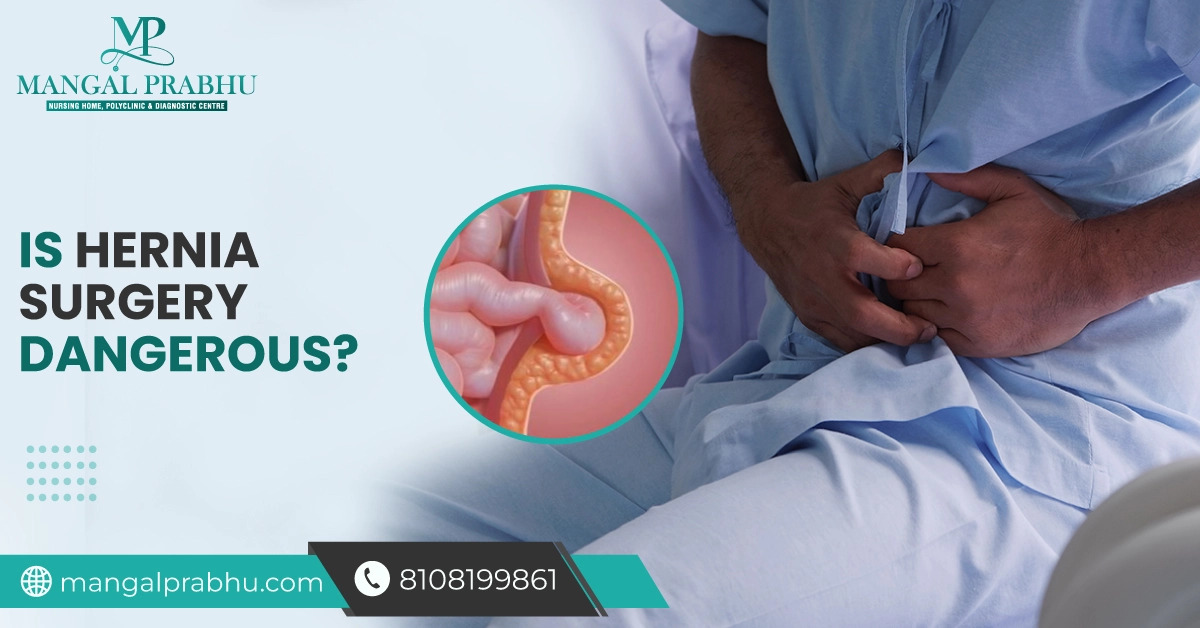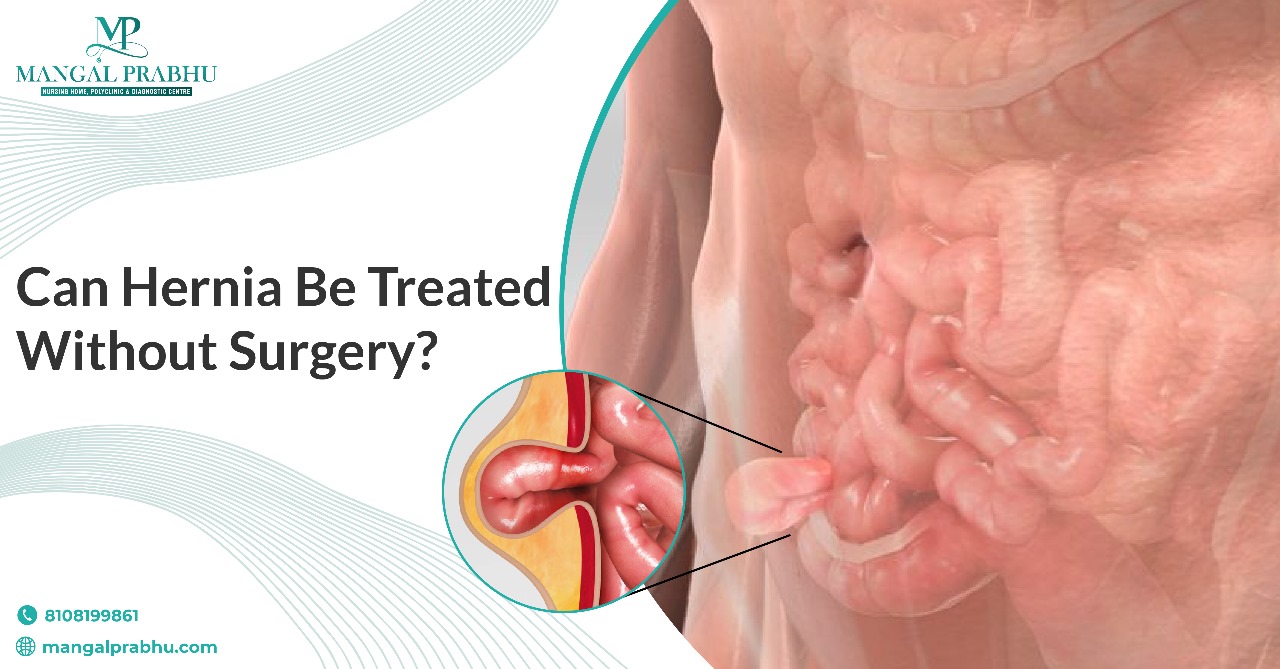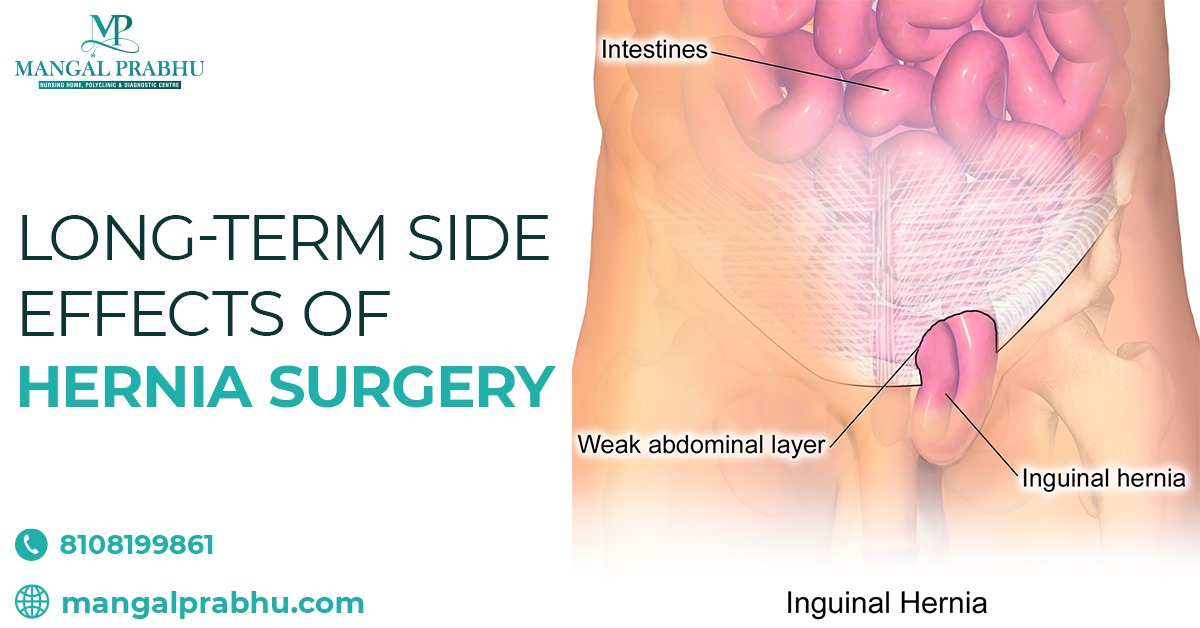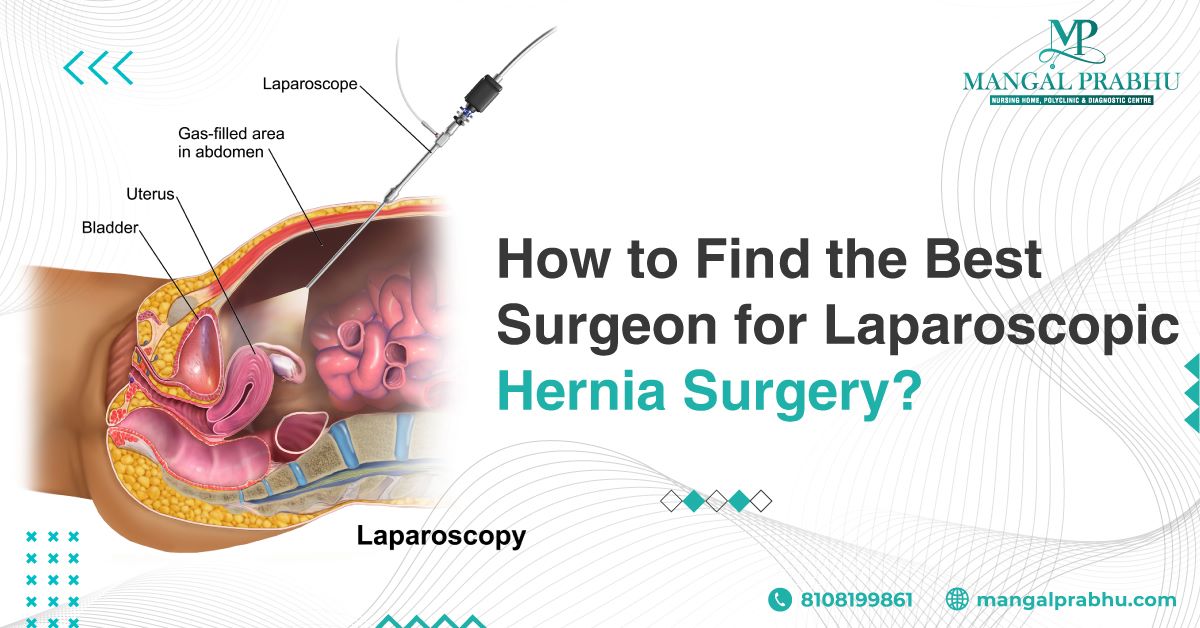
Exercises To Avoid After Hernia Surgery
Hernia surgery in Navi Mumbai is an invasive medical procedure that involves pushing the bulging tissue back into its original place. The surgeon might use mesh to strengthen the abdominal muscles and keep the repaired tissue in place. If you have just had hernia repair surgery, you might wonder how soon you can start exercising. We’ve listed some exercises to avoid after hernia surgery and some alternatives you can try.
Understanding Hernia Surgery Recovery
It’s a fairly safe procedure, but like any surgical treatment, hernia repair involves incisions and stitches that can take time to heal. Most patients return to their normal activities in a week or two, but if your work is physically demanding, it’s ideal to wait a little longer or until your doctor clears you for it. It’s not uncommon to feel pain post-operation, accompanied by fatigue and discomfort. The symptoms should resolve within days.
Exercises to Avoid
1) High-impact Activities:
You can start with mild exercises, like walking, but anything that puts strain on the surgical site should be avoided for at least 2 weeks. Running, jumping, aerobics, and all kinds of high-intensity physical activities are a big no.
2) Heavy Lifting or Weight Training:
For a few weeks after surgery, do not lift anything heavier than 10 pounds. Do not lift dumbbells or any heavy objects. Even something as simple as a grocery bag can put unnecessary strain on your abdominal muscles. Likewise, avoid exhausting your body with physical activities, as they may delay your healing.
3) Abdominal Exercises:
Any general surgeon in Navi Mumbai will strictly advise against abdominal exercises, such as situps, leg raises, crunches, and other activities that can strain your abdominal muscles. It’s best to hold off on these until your doctor gives you clearance.
Safe Alternatives
Instead of high-intensity workouts and weight training, you can consider these safer alternatives.
a) Gentle Walking:
Walking around your house is the best exercise for the first couple of days after surgery. It builds your muscle stamina. Start with a gentle walk using canes or walking aids, if recommended. Slowly, you can work your way up to a 20-minute walk without assistance.
b) Light Stretching:
Within a few weeks, you can incorporate light stretching into your routine. It improves your flexibility, reduces stiffness, and prepares your body for workout sessions. You can try a cat-cow stretch, seated forward bend, and standing side bends.
You can try other low-impact activities, like swimming and stationary cycling.
Tips for a Smooth Recovery
Recovery from hernia surgery can vary from patient to patient and usually depends on the type of surgery you’ve had and its complexity. Here are a few tips to ensure a smooth recovery after the procedure:
- Always consult your doctor before starting a new exercise
- Listen to your body and stop when you feel pain or fatigue
- Start slow
Conclusion
Establishing an exercise routine will speed up your healing and help you get back in shape. However, before proceeding, it’s important to talk to your surgeon about what’s safe and what to avoid.

Is Hernia Surgery Dangerous?
What is Hernia Surgery?
Hernias is a condition where an organ or tissue pushes via a weakness in the muscle or connective tissue. Even though hernias can be helped with a change in lifestyle, the surgical remedy is occasionally important, mainly when it causes excessive aches and starts to intervene with everyday existence.
Types of Hernias and Their Risks
There is a huge style of hernia that includes femoral, inguinal, umbilical and hiatal hernias. Every individual of hernia has an excellent amount of danger. For instance, inguinal hernia are discovered greater in guys and might cause bowel obstruction if left untreated. On the other hand hiatal hernias can cause acid reflux and other issues in digestion. Nevertheless, the danger of hernia surgery depends on several factors: the form of hernia, the affected person’s fitness, and the surgical approach that is utilized in surgery. Mangal Prabhu Hospital provides treatment for hernia.
Safety Measures and Advances in Hernia Surgery
The improvement in scientific technology has stepped forward the protection of hernia surgery in the past few years, which has hindered the threat to an exquisite volume. Small and brief strategies consisting of laparoscopic and robot-assisted surgical operation have appreciably reduced the threat of headaches and feature also shortened the recovery time in contrast to conventional open surgical operation. Hernia Treatment in Navi Mumbai deals with sufferers with hernia and presents them with an efficient remedy. Moreover, Surgeons now have a higher right of entry to imaging generation and surgical instruments, permitting them to provide particular and powerful remedies for hernias.
Also Read: Symptoms Of Hernia In Male
Success Rates and Recovery Post-Surgery
In preferred, hernias surgical operation has an extra fee of success than failure; it facilitates in relieving the ache of patients and their symptoms and also reduces the chance of hernias recurrence. The restoration time after the surgical procedure varies depending on the sort of surgery executed and the character affected person. Still, usually, patients return every day for a few weeks after the surgical procedure. Patients must comply with the publish-surgery instructions like averting lifting heavy stuff and increasing bodily hobbies; following those can help and ensure great healing.
Common Concerns and Misconceptions about Hernia Surgery
Despite the good effectiveness of hernia surgery, there are nonetheless common things that should be handled and misconceptions approximately hernia surgical treatment. A large variety of people fear the hazard of infections, bleeding, or nerve damage, while others consider the possibility of recurrence of the hernia. These dangers are a gift with each surgical procedure. Still, they are distinctly low, especially while carried out by means of a professional healthcare professional, including a Hernia Surgeon in Navi Mumbai with a specialized clinical facility.
Conclusion
The conclusion is that common hernia surgical treatment is safe and effective to a notable degree for treating hernias and relieving pain and its various signs. The development in medical generation and surgical techniques is a major key that enables a lot in decreasing the danger involved in traditional open surgical treatment. By knowing the impact and protection measures and development in surgical procedures, patients need to make decisions about their treatment options; in case you are looking for a treatment option, then you definitely need to visit Mangal Prabhu Hospital as they provide a notable remedy.

Symptoms Of Hernia In Male
I. Introduction
This condition can develop in various parts of the body, but it commonly occurs in the abdomen or groin area. According to Mangal Prabhu Hospital, recognizing the symptoms of hernia in males is crucial for several reasons. Firstly, timely identification allows for prompt medical intervention, which can prevent complications and alleviate discomfort.
Hernia occurs when an organ or fatty tissue protrudes through a weak spot or tear in the surrounding muscle or connective tissue. Additionally, untreated hernias can lead to more serious complications, making early detection essential for optimal outcomes. Here, you can delve into the various symptoms of hernia in males.
II. Common Symptoms of Hernia in Males
i) Bulge or swelling in the groin or scrotum:
One of the most prominent signs of a hernia in males is a visible bulge or swelling in the groin or scrotum area. This bulge may become more noticeable when standing, coughing, or straining.
ii) Pain or discomfort in the affected area:
Hernias can cause varying degrees of pain or discomfort, ranging from mild to severe. This discomfort may worsen with physical activity or prolonged periods of standing.
iii) Heaviness or pressure sensation:
Some individuals with hernias may experience a sensation of heaviness or pressure in the affected area, particularly during physical exertion or lifting heavy objects.
iv) Difficulty or pain during physical activities:
Engaging in physical activities such as lifting, bending, or exercising may exacerbate hernia symptoms, leading to increased discomfort or pain.
III. Less Common Symptoms of Hernia in Males
While the aforementioned symptoms are more prevalent, hernias can also manifest through less common signs, including:
a) Nausea or vomiting:
In some cases, hernias may cause nausea or vomiting, especially if the protruding organ or tissue becomes obstructed.
b) Changes in bowel movements:
Hernias affecting the abdominal region can sometimes lead to changes in bowel movements, such as constipation or difficulty passing stool.
c) Urinary difficulties:
Inguinal hernias, which occur in the groin area, may cause urinary difficulties such as frequent urination or difficulty emptying the bladder.
IV. When to Seek Medical Attention
If you experience any of the symptoms mentioned above, it’s crucial to consult a healthcare professional like Hernia Surgeon in Navi Mumbai promptly. Delaying medical evaluation and treatment can increase the risk of complications associated with hernias, such as strangulation or obstruction of the protruding tissue.
V. Treatment Options
- Surgical interventions: Repairing weakened muscles or tissues through surgical procedures.
- Non-surgical approaches: Utilizing methods like wearing supportive garments or trusses.
- Lifestyle modifications for prevention: Implementing habits such as proper lifting techniques and maintaining a healthy weight to reduce the risk of hernia development.
VI. Conclusion
Recognizing the symptoms of hernia in males is essential for early diagnosis and prompt intervention. By being aware of the common signs and seeking timely medical attention, individuals can effectively manage hernias and minimize the risk of complications.
If you’re experiencing any symptoms suggestive of a hernia, don’t hesitate to contact Mangal Prabhu Hospital for expert evaluation and hernia treatment in Navi Mumbai. Your health and well-being are our top priorities.

How To Relieve Hernia Pain?
What is a Hernia?
Hernia is a common abdominal issue that can obstruct the overall well-being of an individual. This issue can be caused due to an undesirable strain and weakness in the tissue or muscle. Hernia most commonly happens when fatty tissue in the abdominal area squeezes through a weak spot in a fascia or connective tissue. Hernia issues are harrowing and can get worse with time. Thus, it would be best for an individual to get proper Hernia Treatment in Navi Mumbai to live a healthy and peaceful life. Furthermore, Mangal Prabhu Hospital has world-class doctors who specialize in offering the best treatment plan for Hernia for the betterment of their patients.
Types of Hernia
- Inguinal Hernia: This Hernia most commonly occurs in men’s groin area. Inguinal Hernia contains the protrusion of a part of the intestine via a weak spot in the abdominal tissue.
- Femoral Hernia: Similar to inguinal hernias but occurs lower in the groin, near the upper thigh. It is more common in women.
- Umbilical Hernia: Develops near the navel or belly button and is often seen in infants. It occurs when the abdominal muscles do not close properly after birth.
- Incisional Hernia: Forms at the site of a previous abdominal surgery, where the abdominal muscles have weakened or separated.
Symptoms of Hernia
Hernias often present with the following symptoms:
- Visible Lump or Bulge
- Pain or Discomfort
- Aching or Burning Sensation
- Indigestion or Difficulty Swallowing
Also Read: CAN HERNIA BE TREATED WITHOUT SURGERY?
Causes of Hernia
The development of hernias is often attributed to a combination of muscle weakness and increased pressure on the affected area. Some common causes include:
- Age-Related Muscle Weakness: Muscles naturally weaken over time.
- Persistent Coughing or Sneezing: Increases abdominal pressure.
- Straining During Bowel Movements: Especially in cases of constipation.
- Heavy Lifting: Puts strain on abdominal muscles.
How to Relieve Hernia Pain
Surgery is one of the most effective treatments for Hernia. Thus, consulting with the best Hernia Surgeon in Navi Mumbai from Mangal Prabhu would be best. However, some of the common ways to relieve hernia pain are:
- Medication: It is best to ask your healthcare provider to suggest an over-the-counter painkiller for hernia pain.
- Wearing a Truss or Support Belt: Provides support to the affected area.
- Cold or Warm Compress: Applying to the Hernia may alleviate pain and reduce swelling.
- Avoiding Heavy Lifting: Minimize activities that strain the affected area.
- Maintaining a Healthy Weight: Excess weight can worsen hernia symptoms.
- Dietary Changes: For hiatal hernias, smaller, more frequent meals and avoiding certain foods.
Prevention Tips
Taking proactive steps to prevent hernias or reduce the risk of recurrence includes:
- Maintaining a Healthy Weight: Through a balanced diet and regular exercise.
- Avoiding Straining During Bowel Movements: Ensuring an adequate fiber intake and staying hydrated.
- Lifting Properly: Using proper techniques, such as bending at the knees and keeping the back straight.
- Quitting Smoking: Smoking weakens tissues, increasing the risk of Hernia.
Conclusion
Hernia is a critical issue that requires proper medical attention and treatment. However, by following the preventive measures and taking the precautions mentioned, an individual can quickly get through hernia pain without hassle.

Can Hernia Be Treated Without Surgery?
A hernia is an unusual bulge caused by the organs that push through the weak muscle walls. The bulge is visible when you cough, sneeze, or put any kind of pressure on the affected area. Hernia can occur in the groin area, on your abdomen, and other parts of the body. They can be a birth defect or occur as you age. Hernias are also common in people who have undergone major surgery. Fortunately, hernia treatment in Navi Mumbai is available for those experiencing pain, discomfort, and other symptoms of hernia.
Non-Surgical Treatment Options
Unfortunately, the hernia will require surgery eventually. It doesn’t go away on its own. You can find temporary relief from certain medications, corsets that keep the bulge in place, and mild exercises, but these are only temporary solutions.
1) Medication:
Medication alone can’t help you get rid of a hernia, but it can relieve the symptoms and discomfort. For Hiatal hernia, you can take over-the-counter medication to relieve acid reflux and heartburn. Likewise, painkillers can help relieve pain.
2) Exercise:
If you practice high-intensity exercises or weightlifting, you might have to ask your healthcare provider if that’s safe. Any exercise that puts excess pressure on the bulge can make it worse. Talk to a hernia surgeon in Navi Mumbai and discuss the best exercises to prevent hernia from growing.
3) Dietary Changes:
Hiatal Hernias can cause GERD, heartburn, and many digestive issues. These are often triggered by certain foods that can cause your stomach acid to find its way to your throat. Take note of the foods that trigger these symptoms and focus on a healthy and balanced diet. Try to eat small and frequent meals.
4) Maintain a Healthy Weight:
Being overweight increases your risk of developing or worsening the existing hernia. It’s important to discuss your health goals with a healthcare provider and follow a weight-loss plan to shed those extra pounds.
Pros and Cons of Non-Surgical Treatments
As mentioned previously, hernia cannot be cured nor can it be reduced with manual treatments. You can take some steps to avoid the discomfort, pain, and other symptoms associated with the bulge, but you are eventually going to undergo surgery to have it fixed. The good news is a surgical procedure for hernia is minimally invasive and doesn’t take much time to heal.
You can also consider alternatives to open surgery, like robotic surgery or laparoscopic procedure. That said, not all types of hernias cause symptoms. There’s a chance the condition might go unnoticed and won’t require any repair either. It’s still best to consult your healthcare provider to ensure it won’t cause any complications. Let’s check out the pros and cons of non-surgical hernia treatments.
Advantages
- It can help reduce your hernia symptoms
- The non-invasive procedure doesn’t require any post-operative care
- You can carry out your routine activities
Disadvantages
- High risk of bowel obstruction
- Possibility of strangulation
- Hematoma
- Infections
See a healthcare specialist if you see the signs of hernia. Even if it’s causing any symptoms, it’s best to talk to a professional to rule out the possibility of any complications.

Long-term Side Effects Of Hernia Surgery
Hernia surgery is a common procedure that millions of people undergo each year to repair weakened or torn abdominal muscles. While the surgery is generally safe and effective, it’s essential to be aware of potential long-term side effects that can occur after the procedure. In this article, you can explore the long-term side effects of hernia surgery and strategies for managing them.
Overview of Hernia Surgery
Hernias occur when internal organs or tissues push through weakened or torn muscles, creating a noticeable bulge or lump. Surgery is often recommended to repair the hernia and prevent complications. At Mangal Prabhu Hospital, where you can find the experienced Hernia Surgeon in Navi Mumbai, patients receive comprehensive care and advanced surgical techniques to ensure successful hernia repair.
Short-term Side Effects of Hernia Surgery
Before delving into long-term side effects, it’s important to briefly mention the short-term side effects that patients may experience immediately after hernia surgery. These can include:
- It is normal to experience pain, swelling, and bruising around the surgical site. This discomfort usually subsides in the days and weeks following the surgery.
- Anesthesia and pain medications can cause temporary nausea and vomiting after surgery.
- Patients may need to restrict physical activity and avoid heavy lifting for a certain period to allow the surgical site to heal properly.
Long-term Side Effects of Hernia Surgery
While hernia surgery is generally successful in repairing the hernia, there are some potential long-term side effects that patients should be aware of:
- Some individuals may experience chronic pain or discomfort at the surgical site, known as chronic post-herniorrhaphy pain. This condition can persist for months or even years after the surgery.
- Although hernia surgery is intended to provide a permanent solution, there is a small risk of hernia recurrence. It can happen if the repaired tissues weaken or tear again over time.
- It’s common to experience numbness or altered sensation around the surgical scar. It usually improves over time but may not completely resolve in some cases.
- In rare instances, hernia surgery can lead to scar tissue formation that causes bowel obstruction. Symptoms may include abdominal pain, bloating, and constipation.
Strategies for Managing Post-Surgery Side Effects
If you experience long-term side effects following hernia surgery, here are some strategies to manage them effectively:
- Consult your healthcare provider for pain management options, including physical therapy, medications, or nerve blocks.
- Follow your surgeon’s post-operative instructions diligently, including avoiding heavy lifting and maintaining a healthy lifestyle to reduce the risk of hernia recurrence.
- Gentle massage and moisturizing of the surgical scar can help improve its appearance and reduce sensation changes.
- Schedule regular follow-up appointments with your hernia surgeon to monitor your recovery and address any concerns promptly.
Conclusion
Hernia surgery is a valuable procedure that can relieve and prevent hernia complications. While potential long-term side effects, such as chronic pain or recurrence, are relatively rare. Most patients experience successful outcomes. If you require Hernia Treatment in Navi Mumbai, Mangal Prabhu Hospital is home to experienced hernia surgeons who can provide comprehensive care and guidance throughout your surgical journey. Open communication with your healthcare provider is key to managing any post-surgery side effects and ensuring a successful recovery.

How to Find the Best Surgeon for Laparoscopic Hernia Surgery?
Finding the best surgeon for laparoscopic hernia surgery is a difficult step for having a successful and safe procedure. This blog offers valuable tips for finding the best hernia surgery surgeons in Navi Mumbai. Follow the right method and increase your successful treatment rate.
What is Laparoscopic Hernia Surgery?
Hernia surgery includes using a laparoscope, a thin fiber-optic instrument/tube equipped with a camera. The surgeon cuts the abandonment around the hernia site, and the laparoscopy is inserted through the cut to provide a clear view of the area. The hernia is then repaired using webbing and stitches by which the cuts are closed. You can visit Mangal Prabhu Hospital for this surgery as they have excellent professionals.
Benefits of Laparoscopic Hernia Surgery
Hernia surgery has become so popular Hernia Treatment in Navi Mumbai these days because of its benefits. Some of the benefits of hernia surgery include:
1. Reduction in Pain:
Small cuts in laparoscopic surgery result in less damage compared to general traditional open surgery
2. Faster Recovery:
Since there are small incisions in surgery, the recovery from surgery is way quicker than open surgery
3. Minor Scars:
Laparoscopic surgery doesn’t leave prominent scars, compared to open surgery, which has minimal scars
4. Chances of Fewer Infections:
Laparoscopic surgery reduces the chances of risk of wound infections and other complicated infections
5. Fewer Chances of Recurrence of Hernia:
Laparoscopic techniques have been associated with less rate of recurrence of hernia.
How to Choose a Surgeon for Laparoscopic Hernia Surgery
You must carefully consider a few factors to choose the best surgeon for laparoscopic hernia surgery. Here are some things to consider while looking for a surgeon for laparoscopic surgery.
i. Surgeon’s Qualifications:
Verify the surgeon’s qualifications and certification and check whether he has done training and has experience in laparoscopic hernia surgery.
ii. Experience:
You can inquire about the Surgeon’s Experience. A surgeon with multiple surgeries is likely to have better skills and experience. At Mangal Prabhu Hospital, you can find experienced surgeons who offer excellent treatment for hernias.
iii. Hospital Affiliations:
Hospital affiliations play an essential role. Look for hospitals with better facilities, advanced technologies, and high standards.
Also Read: How To Prevent Hernia?
Questions to Ask Your Laparoscopic Hernia Surgeon
While looking for a surgeon, you must ask him several questions, such as:
- How many laparoscopic hernia surgeries they had performed?
- What is their success rate in terms of hernia repair and recurrence?
- How do they determine if a patient is suitable for laparoscopic hernia surgery?
- What is their preferred technique for laparoscopic hernia repair, and why?
- What measures do they take to ensure patient comfort during and after the procedure?
Tips for Choosing the Right Surgeon
- Ask others’ opinions, as it is better to take others’ opinions while searching for a surgeon.
- Trust the surgeon as trusting them is necessary to find a good surgeon.
- You must ensure your surgeon is willing to listen to what you say to him.
- The location of surgeons’ practice and easy access to the hospital.
Conclusion
Choosing the best Laparoscopic Hernia Surgeon in Navi Mumbai is a hard decision that can affect your overall experience and the outcome of the surgery. You must take the time to research and choose the best hospital and best surgeon.

How To Prevent Hernia?
Hernia occurs when an internal organ or your abdominal tissue pushes through the muscle wall, leading to a bulge in your abdomen. Hernia can be avoided, but whether it can be prevented or not depends on the type. Hernia that occurs following abdominal surgery or childbirth, for example, cannot be predicted or avoided. You will have to consult a hernia surgeon in Navi Mumbai to determine a suitable treatment.
What Causes Hernia?
Hernia is mostly caused by strain on your abdominal muscles or the groin because of weakened muscles. Strenuous exercises, pregnancy, obesity, constipation, and constant coughing are the few common causes of hernia. The bulge worsens as more pressure is applied to the abdominal muscles.
Those who have had multiple pregnancies, a history of abdominal surgery, or perform activities that put excessive pressure on their abdominal walls are at high risk of developing umbilical hernia. The type of hernia is defined based on the area it occurs. A vast majority of the hernias are classified as inguinal hernias that occur when the part of your intestine pushes through the weakened muscle and develops in your groin.
Unfortunately, there’s not much you can do about the weakened muscles that lead to the inguinal hernia, but there are ways to prevent it from worsening. Below we’ve shared some steps recommended by the hernia treatment center in Navi Mumbai for those at a higher risk of developing a hernia.
Also Read: What Is Hernia In Women?
Tips for Preventing Hernia
The right ways to prevent a hernia depend on the type of hernia. An incisional hernia, for instance, develops in your abdomen around the site of the incision. It happens when the intestine pushes through the weakened area. Sadly, there’s not much you can do about it, except for taking general precautions. For other types of hernias, here’s what can help.
1. Lose Weight:
It’s easier said than done. However, obesity is one of the common causes of hernia, and shedding those extra pounds can definitely help. The excess body fat puts extreme pressure on your abdominal wall when you move, sit, stand, or perform any strenuous exercise. It’s advisable to discuss your weight goals with the doctor and develop a diet and exercise plan that works for you.
2. Get Exercise Regularly:
Exercising keeps your body in shape, strengthens muscle walls, and prevents different types of hernias. But exercises that put too much pressure on your abdominal wall can be risky. Pilates, sit-ups, aerobic activities, and Yoga are a few light exercises that may help. You should avoid squats, jumping, and other strenuous exercises.
3. Avoid Constipation:
Take fiber supplements and drink sufficient water to avoid constipation. If increasing your fiber intake, hydration, and lifestyle changes have not helped, consider taking laxatives. Painkillers and anesthesia are the common causes of constipation. And straining during the bowel movement after surgery will particularly increase your risk of getting a hernia.
Other than that, avoid smoking and heavy lifting. Get treatment for an enlarged prostate and persistent coughing to prevent strain on your abdominal muscles.
Conclusion:
In conclusion, healthy behaviors and thoughtful decisions are key to preventing hernias. People can dramatically lower their risk of getting a hernia by keeping a healthy weight, using proper lifting techniques, exercising frequently, and giving up smoking. Furthermore, being aware of any signs and obtaining immediate medical care when required can aid in avoiding complications and encourage early treatment. When it comes to hernias, always remember that prevention is always better than cure.

What is Hernia in Women?
What is Hernia and How Does It Affect Women?
A hernia is a disorder that develops when an organ or piece of tissue pushes through a tear or weak area in the surrounding muscle or tissue. This may occur in the abdomen, groin, or diaphragm, among other body regions. Hernias can appear unexpectedly or develop gradually over time.
According to Hernia Treatment Hospital in Navi Mumbai, women can get hernias, however, they do so less commonly than men do. The following are some typical hernias that might affect women:
Common Types of Hernia in Women
- Inguinal Hernias: More frequently seen in men, these hernias develop in the groin region. Yet women can also get inguinal hernias, especially if they have a history of hard lifting or many pregnancies.
- Umbilical Hernias: These hernias are more frequent in women than in males, particularly in those who have had several pregnancies or who are obese. They develop close to the belly button.
- Incisional Hernias: Hernias at the site of previous abdominal surgery, known as “incisional hernias,” might weaken the abdominal wall and increase the risk of hernias.
- Hiatal Hernias: When a portion of the stomach pushes through the diaphragm and into the chest cavity, a hernia occurs. As they age, women are more likely to develop hiatal hernias, which can be accompanied by reflux symptoms.
Also Read: DO I NEED SURGERY FOR HERNIA?
What are the Causes of Hernia in Women?
Hernias happen when a weak area in the surrounding muscle or tissue allows an internal organ or tissue to protrude through. Although hernias are typically associated with men, they can also affect women. Although the causes of hernias in women might vary, the following characteristics are frequently linked to an increased chance of getting one:
1. Childbirth During Pregnancy:
The stress on the abdominal muscles during these processes might weaken the abdominal wall, increasing the risk of a hernia.
2. Obesity:
Having a large waistline or being obese can place additional tension on the abdominal muscles and increase the risk of a hernia.
3. Heavy Lifting:
Frequently lifting weights or objects that are heavy might cause the abdominal muscles to get strained and cause a hernia.
4. Coughing or Sneezing Repeatedly:
Prolonged coughing or sneezing can impose stress on the abdominal muscles, causing them to deteriorate over time.
5. Past Operations:
According to a General Surgeon in Navi Mumbai, women who have had abdominal surgery in the past may be more susceptible to hernias.
6. Genetics:
Due to a family history of the illness, certain women may be predisposed genetically to have hernias.
What is Abdominal Wall Weakness in Women?
Despite being similarly linked, abdominal wall weakness in women is not the same as a hernia. When the muscles and tissues that make up the abdominal wall are weak or injured, it is easier for organs and other tissues to push through the weak spot and produce a hernia.
This condition is referred to as abdominal wall weakness. Although poor abdominal wall tissue can result in the development of a hernia, this is not always the case. But, if unchecked, abdominal wall weakness can eventually raise the chance of developing a hernia. Both disorders can cause pain, discomfort, or an abdominal bulge as symptoms.
What is Diastasis Recti?
The two parts of the rectus abdominis muscle, also referred to as the “six-pack” muscle, split along the Linea alba, the connective tissue that runs along the middle of the abdomen, in a condition known as diastasis recti. Pregnancy, excessive weight gain, or abdominal surgery are all risk factors for this separation. Diastasis Recti is not the same as hernia though it is possible to have both a hernia and diastasis recti, and in certain situations, both diseases may need to be treated surgically.
Conclusion
Women can develop hernias just as frequently as males. Femoral hernias, for example, maybe more common in women than in men because of the differences in their anatomical structures. Due to the stress imposed on the abdominal muscles during pregnancy and after childbirth, women may also be more susceptible to developing hernias.
Women should be aware of the symptoms and signs of a hernia, which include pain, discomfort, and an obvious bulge in the affected area. Early medical intervention can stop the hernia from getting worse and potentially leading to catastrophic problems.
Women’s hernias can be treated surgically or with supporting clothing or belts that can help control discomfort. In general, women can lower their risk of getting hernias and maintain their health and well-being by being aware of the risk factors and taking preventative actions.

Essential Health Screening After 40
People around the age 40 have highly demanding jobs, responsibilities of elderly parents and growing children or all of the above, and therefore it’s easy to ignore health aside, though unintentionally. But 40 is the time to evaluate your overall wellbeing, and to plan for the long-run. It is considered a milestone when the risk of many health conditions increases. It could be due to lifestyle habits, negligent of health due to busy schedules and responsibilities, stress factors or hereditary. With today’s advance technology, most of the health issues are detectable and curable if treated at the right time. And the only way to stay on top of it is adopting measures such as lifestyle enhancement and regular medical check-ups and follow-ups.
Health Issues after 40.
Health screenings are generally an essential aspect of preventative health for people of all ages but as we grow older, regular check-ups for various factors must be considered as a priority. Health Care Providers in a Multispecialty Hospital in Navi Mumbai has shared the conditions they often spot in patients of this age.
- Overactive bladder.
- Perimenopausal Symptoms.
- Kidney stones.
- Urinary tract and prostate infections.
- Food allergies.
- Osteoarthritis.
- High blood pressure.
- Erectile dysfunction.
- Skin cancer.
- Depression.
- Anxiety.
Health Screenings for Men of 40.
- Prostate checks.
Prostate cancer spreads slowly, and early detection usually lead to successful treatment. The two main screening exams for prostate cancer are:
- Prostate-specific antigen (PSA test).
- Digital rectal exam (DRE).
- Colonoscopy.
Colorectal cancer (CRC) accounts for a lot of death and disease all over the world and is especially on the rise in the West. According to experts in the matter, if a polyps/tumours found on colonoscopy is small then they are easily removable, and the disease is stopped at that moment. It is highly recommended to begin CRC screening at an earlier age especially if there is a family history of CRC.
- Cholesterol Check.
Cholesterol tests should be a standard part of annual health check-ups, since cholesterol is seen as a biomarker of potential disease.
- Blood Sugar Test.
Blood sugar testing, and monitoring for good health, is highly advisable as it is one of the risk factors for metabolic syndrome. Blood sugar testing alone can alarm the health care providers that there may be a problem in the person’s health.
- Electrocardiograms (ECG).
The ECG reads the electrical impulses of the heart, and many cardiac abnormalities can be detected from these tests.
- Bone density tests.
Low bone density leading to hip fractures is a major medical problem. It is recommended that men with any of the above risk factors must consult their doctor for treatment and care.
- Dental check-ups.
Dental health is an important part of an adult’s overall health and wellness and being negligent towards it can pave the way for several other diseases.
- Eye Exams.
Eye exams can spot early signs of many chronic eye diseases, many of which do not have early symptoms.
Health Screenings for Women of 40.
1.Body mass index (BMI)/obesity screening.
Your weight and height are measured to calculate your BMI. The higher your BMI, the more chance you have of developing heart disease, high blood pressure, type 2 diabetes, certain cancers and other diseases.
2. Depression screening.
A test consisting of series of questions is administered to determine if you’re depressed or at risk for suicide.
3. Alcohol, smoking and substance misuse screening.
A test consisting of series of questions is administered to determine amounts and frequency of use.
4. Blood pressure check.
If you have history of blood pressure issues in your family, you should keep track of it by regular check. The goal is to have a blood pressure lower than 130/80 as an adult.
5. Cholesterol screening.
A cholesterol screening (also called a lipid panel) is a blood test that measures the amount of cholesterol and triglycerides in your blood.
6. Diabetes screening as part of a cardiovascular risk assessment.
It involves checking the glucose level in your blood while you are empty stomach. If your blood glucose level is too high, a retest is done to confirm a diabetes diagnosis.
7. Mammogram screening for breast cancer.
Women should begin mammogram tests (it’s an X-ray of the breast) at age 40 every year to stay on top of the matter.
8.Pap test screening for cervical cancer.
It is a test that looks for any abnormal cells on the cervix, as well as for HPV (human papillomavirus) infection.
9.Eye and dental exams.
You should have eye exams at least every two years if you’ve reached the age of 40. Schedule dental cleanings and exams every six months, and be diligent about following dental care regime.
10.Human immunodeficiency virus (HIV) screening.
HIV should be tested regardless of sexual activity, lifestyle, age or gender.
